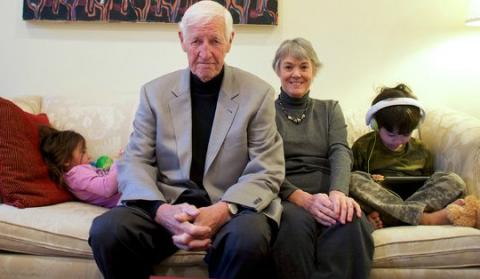The New York Times this morning has an extraordinary 13-minute video from a team of reporters including the independent journalist Jonathan Franklin, and an accompanying article by Mark Mazzetti, about the heroic anti-war activists who broke into an FBI field office in 1971 and took all of the documents they could get their hands on, and then sent those documents to newspapers, including the New York Times and Washington Post.
Some of those documents exposed J. Edgar Hoover's COINTELPRO program, aimed at quashing internal political dissent through surveillance, infiltration and other tactics. Those revelations ultimately led to the creation of the Church Committee in the mid-1970s and various reforms. The background on the Church Committee's COINTELPRO findings and the "burglary" operation which exposed it is here.
With the statute of limitations elapsed on their "crimes", ones the FBI could never solve, the courageous perpetrators have now unveiled themselves. The NYT story is based on a new book by Post reporter Betsy Medsger and the forthcoming documentary 1971 (of which my journalistic partner, Laura Poitras, is an Exective Producer). There are four crucial points to note:
(1) Just as is true of Daniel Ellsberg today, these activists will be widely hailed as heroic, noble, courageous, etc. That's because it's incredibly easy to praise people who challenge governments of the distant past, and much harder to do so for those who challenge those who wield actual power today.
As you watch the video, just imagine what today's American commentariat, media class, and establishment figures from both parties would be saying in denouncing these activists. They stole government documents that didn't belong to them! They endangered national security! They did not take just a few documents but everything en masse that they could get their hands on. Former FBI and CIA chief William Webster is shown in the film conceding that the documents they revealed led to important debates, but nonetheless condemning them on the grounds that they used the "wrong methods" - criminal methods! - to expose these bad acts, insisting that they should have gone through unspecified Proper Channels.
That all sounds quite familiar, does it not? Many of the journalists and pundits who today will praise these activists would have undoubtedly been leading the orgy of condemnations against them back then based on the same things they say today.
(2) The crux of COINTELPRO - targeting citizens for their disfavored political views and trying to turn them into criminals through infiltration, entrapment and the like - is alive and well today in the United States. Those tactics are no longer called COINTELPRO; they are called "anticipatory prosecutions" and FBI entrapment. The targets are usually American Muslims but also a wide range of political activists. See here for how vibrant these COINTELPRO-like tactics remain today.
(3) The activists sent the FBI's documents they took to various newspapers. While the Post published articles based on them (after lengthy internal debates about whether they should), the other papers, as Trevor Timm documents, "were not nearly as admirable." In particular:
According to Medsger’s book, even though the New York Times eventually published a story based on the documents, a reporter of theirs apparently handed the documents back to the FBI to help with their investigation. And the Los Angeles Times, never published any story and may have also handed the documents back to the FBI.
Moreover, the U.S. Government exhibited zero interest in investigating and prosecuting the lawbreakers inside the FBI. Instead, they became obsessed only with punishing those who exposed the high-level wrongdoing. This, too, obviously should sound very familiar.
(4) The parallels with the 1971 whistleblowers and those of today, including Edward Snowden and Chelsea Manning, are obvious. One of the 1971 activists makes the point expressly, saying "I definitely see parallels between Snowden's case and our case" and pronouncing Snowden's disclosure of NSA documents to be "a good thing". Another of the activists, John Raines, makes the parallel even clearer:
"It looks like we’re terribly reckless people," Mr. Raines said. "But there was absolutely no one in Washington — senators, congressmen, even the president — who dared hold J. Edgar Hoover to accountability."
"It became pretty obvious to us", he said, "that if we don’t do it, nobody will.”
Medsger herself this morning noted the parallels, saying on Twitter that she hopes that her book "contributes to the discussion" started by Snowden's whistleblowing. The lesson, as she put it: "we've been there before."
Note, too, that these activists didn't turn themselves in and plead to be put in prison by the U.S. Government for decades, but instead purposely did everything possible to avoid arrest. Only the most irrational among us would claim that doing this somehow diluted their bravery or status as noble whistleblowers.
Here again we find another example of that vital though oft-overlooked principle: often, those labelled "criminals" by an unjust society are in fact its most noble actors.
© 2013 Glenn Greenwald
[Glenn Greenwald is a columnist on civil liberties and US national security issues for the Guardian. A former constitutional lawyer, he was until 2012 a contributing writer at Salon. His most recent book is, With Liberty and Justice for Some: How the Law Is Used to Destroy Equality and Protect the Powerful. His other books include: Great American Hypocrites: Toppling the Big Myths of Republican Politics, A Tragic Legacy: How a Good vs. Evil Mentality Destroyed the Bush Presidency, and How Would a Patriot Act? Defending American Values from a President Run Amok. He is the recipient of the first annual I.F. Stone Award for Independent Journalism.]


Spread the word